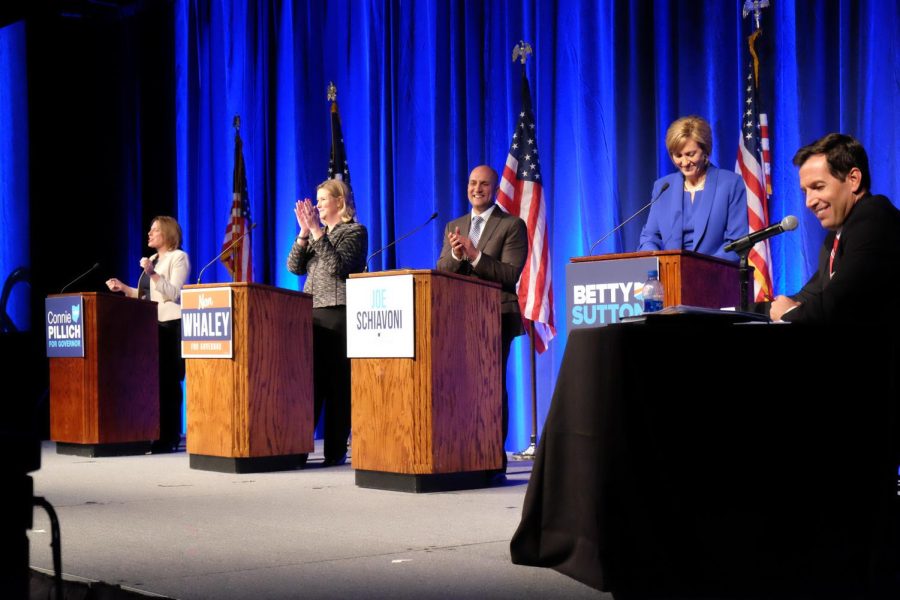Democratic hopefuls debate in Columbus for governor nomination
Democrats debate issues on the stage in Columbus in hopes of landing a nomination for governor Sunday, Oct. 29, 2017.
Democrats hoping to land a coveted nomination for governor took the stage in Columbus Sunday night to hash out the nuances of their platforms and the ways they differ from their Republican counterparts.
Four hopefuls took part in the hour-long debate moderated by WBNS-10TV’s Scott Light. The quartet answered questions submitted by Ohioans on issues like tax reform, jobs, health care and the opiate epidemic. They were similarly aligned on issues like Medicaid expansion and access to birth control, only differing in rhetoric.
Among the candidates currently holding office in Ohio were Sen. Joe Schiavoni of Boardman and Dayton Mayor Nan Whaley. Schiavoni often touted his jobs and infrastructure plan, which he said will strengthen the labor industry by rebuilding roads, bridges and underground infrastructure while training skilled workers and helping support small businesses.
Whaley focused heavily on the opioid epidemic, which has become a pillar of her campaign. She said her time as mayor has helped her understand the needs of everyday Ohioans.
Former Air Force veteran Connie Pillich drew on her military and state legislative experience as signs of her leadership. She served as a state representative for about five years, after foregoing her seat in an unsuccessful bid for treasurer in 2014.
Betty Sutton is a Barberton native who served as a U.S. Representative until 2013 when she lost a re-election bid to Republican Jim Renacci, who is also running for governor. She said her experience in national politics has groomed her for the governor’s mansion.
The first issue broached by the candidates was the use of data and analytics in combatting the opioid epidemic.
Whaley was the first to respond, and she said she’s pushed for better transparency and data from the state before pivoting to Dayton’s lawsuit against pharmaceutical companies.
Her response was pushed back on by Schiavoni, who highlighted legislation he introduced that would provide immediate rehabilitation and relief to the public.
“Suing the drug companies is all well and good, but it’ll take years and years,” Schiavoni said. “It’s about putting out a real plan that’ll help real people today.”
Sutton, like her colleagues on the stage, agreed lawsuits against pharmaceutical companies and education are good measures for addiction prevention. She took a unique track, however, in promoting a jobs program as a solution to the epidemic.
“Nothing stops the needle like a job,” Sutton said.
Pillich similarly agreed with the other candidates, but in addition to education and prevention, called for a hard-line stance against drug dealers and increased funding to police and first responders.
When she was asked about Medicaid expansion, she said she would strengthen the program to improve access for rural Ohioans and veterans. She also supports a public option, which would allow citizens to choose the health care they want to buy into, including insurance available to elected officials.
“If it’s good enough for the politicians, it’s good enough for the people,” Pillich said.
Schiavoni said as governor he would fight for federal investment into Ohio’s health care and ensure the state acted as an example for the proper ways to use that funding. Whaley discussed how hospitals acted as job engines in rural communities and promised to use Medicaid expansion to further that growth.
The candidates also grappled with issues of access and affordability of birth control. Sutton said she would “lead the march” against efforts by Republicans to infringe upon women’s rights.
Pillich talked about her experience as a patient of Planned Parenthood as a young mother and her support of the organization as a politician.
Whaley pledged as governor she would ensure the Department of Health would have a doctor as the head of the organization.
Schiavoni touted his record in the Senate as a supporter of Planned Parenthood and NARAL Pro-Choice Ohio and similarly vowed to veto any attempts to step on reproductive rights.
“For us to be fighting about birth control in 2017, it makes me wonder what century we’re living in right now,” Sutton said.
The candidates were also probed about tax reform and abatements, proving to be a tricky response given that Ohio is a home-rule state, which allows local municipalities to pass laws to govern themselves.
Whaley used her response to push back on the Kasich administration, which she said hasn’t been transparent in its “JobsOhio” initiative. Schiavoni, as he often did during the debate, called upon his jobs plan as a way to renovate and alleviate residential blight while building a business-friendly environment in Ohio. He also discussed how legislation he has sponsored would invest in incubators for young entrepreneurs.
Sutton said she would revisit and reform tax loopholes that she said don’t spur small-business growth. Pillich, like Sutton, attacked the Republican-led loopholes and cuts to local government funding. She said such efforts have put Ohio behind the rest of the nation in job growth and education.
An Ohio Democratic Party representative estimated that 1,100 people were in attendance. She said dinner tickets sold for $100 each, while some debate tickets were given to community members free of cost.
Before the candidates took the stage were a spate of speakers, including Sen. Sherrod Brown and Virginia Gov. Terry McAuliffe. Several awards were given out by Ohio Democratic Party Chairman David Pepper.
When Brown took the stage, the crowd rose to its feet in applause and cheers. In typical fashion, the senator gave thanks to the wait and kitchen staff for their help with the event.
Contact Andrew Keiper at [email protected].
Andrew Keiper is the enterprise editor. Contact him at [email protected].



